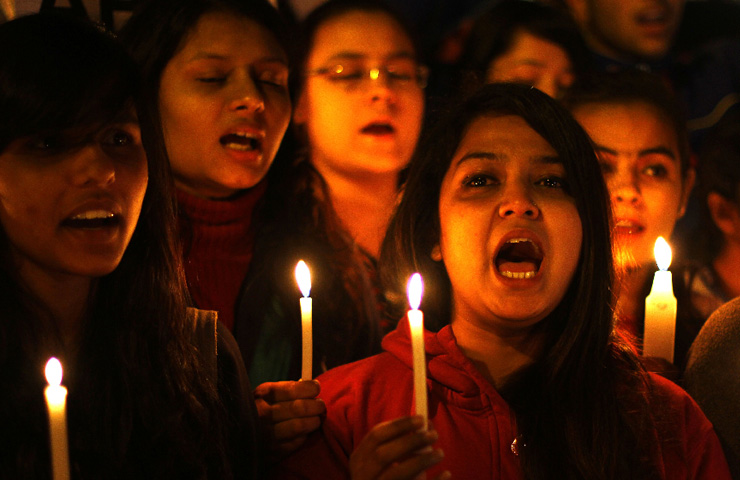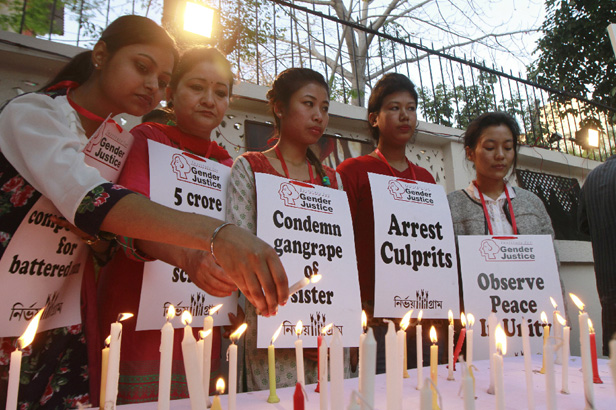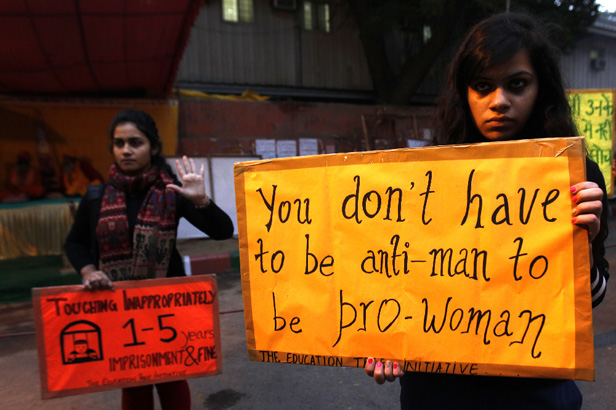
SOURCE: Hindustan Times
Alarm Bajne Se Pehle, Jaago Re
That WhatsApp forward won't solve anything. If you want to ensure a safer world for women tomorrow, there's work to be done now. And it begins from home.

Let's start with some numbers: As per the latest data from National Crime Records Bureau, the crime rate against women rose from 41.7% to 53.9%, between 2011 and 2015. Up to 3,27,394 cases were reported in 2015 alone, including 34,651 cases of rape, 4,437 cases of attempted rape, 59,277 kidnapping and abductions, 7,634 dowry deaths, and a whopping 1,13,403 cases of domestic cruelty, among others. Unfortunately, 'reported' is the key word here, given that a majority of crimes against women remains unregistered, even in 2017. Therefore, as upsetting as these numbers may seem, they barely paint the whole picture.

SOURCE: Hindustan Times
Every news report following a rape or sexual assault usually begins or ends with these statistics, often presented attractively through graphs, charts, illustrations, and even the occasional meme. Whatever the format, the information is neither new nor surprising. And yet our collective sense of outrage seems to be ignited only after a fresh incident hits the headlines. By then, though, whatever we do ends up being too little, too late.
As an individual, if you've always wanted to make a difference to the alarming scenario of women's safety in India (but didn't know how to)—here's a 5-step starter kit.
1. Know your basic rights
When it comes to reporting a crime several women hesitate in filing a report, fearing social backlash, family dishonor, or insensitive law officials. This naturally awards a sense of impunity to sexual offenders, who are tempted to go even further next time. Wherever possible, therefore, it's important to arm ourselves with the laws and rights at our disposal. For instance, the Zero FIR ruling by the Supreme Court states that a rape victim can register her complaint from any police station (and not necessarily the one closest to where the incident occurred). She can also file this report online or through registered post. In fact, the police are bound to record a rape FIR whenever the victim chooses to come forward, even weeks or months after the incident has taken place.
It is only once we have a clear idea of our rights, that we can encourage others to step forward, report crime, and gradually break the vicious circle of shame, impunity, and repeated offences.

SOURCE: Hindustan Times
Blame, shame, and backlash are the main reasons why most women hesitate to press assault charges. Shaming the woman for her clothes, her lifestyle, or simply the place she happened to be at the time of the crime is a knee-jerk reaction with damaging repercussions. 'She deserves it because she's a sex worker,' or 'She was hanging out with boys and wearing shorts' are convenient narratives spun by a patriarchal society, which aim to shift blame from the perpetrator to the victim. This lies at heart of rape culture, and is by far the biggest way we fail those brave enough to report a crime.
It goes without saying that we must end this toxic and dangerous practice of victim blaming if we're to make this a safer, saner, and more respectful society for women.
3. Have the talk with your family
This is particularly crucial when you consider that over 90% of rapes reported in India are committed by people familiar to the victim, including relatives, neighbors, and employers. To create an equal as well as a safer space for women, it's important to drive change right from an early age. Children, after all, follow by example. When a boy finds that the rules meant for his sister do not apply to him, it conditions him to believe that there's a lot he can get away with that girls cannot. Similarly, we instruct our daughters to watch out for dangers on the road, but often forget to teach our sons something as basic as consent and accountability. As a consequence, we raise girls who lack confidence and boys who think they can get away with anything – a recipe for disaster if there was ever one.
The next time you find yourself saying 'boys will be boys', take a moment to reconsider; you may be part of the problem.

SOURCE: Hindustan Times
From chowmein and cell phones to hostel curfews, politicians over the past several years have found many innovative things to blame for the high incidence of crimes against women. While we may laugh over them, these statements ultimately reflect that authorities have neither learnt to take these crimes seriously nor handle them sensitively. To make things worse, these ridiculous notions often distract us from the larger picture – from outraging over a rape, we merely move on to outraging over stupidity. Rather than shake our heads and carry on, next time point out how all this nonsense prevents us from rectifying the sorry state of women's safety in India.
Retaliate with demands instead: Ask for safer public transport, well-lit community spaces, faster processing of cases, higher conviction rates, and sensitive handling of victims by concerned authorities.
5. Don't forward that rape joke
We often let issues like gender inequality take a backseat because the problem seems too large and complex for any one individual to tackle. However, there is one thing you can personally do to make sure that things don't get worse—and that is to stop forwarding, creating, or share insensitive content among others.
Repeat after us: Rape jokes are not funny. Do not forward them even for a laugh, and definitely reprimand those who do. The same logic holds for sexist jokes and forwards passed around on family groups, as well as Bollywood chartbusters that celebrate harassment as love. Point out how such jokes, songs, and ideas create a culture of misogyny and objectification, ultimately creating a world where men presume that 'no' only means they must try their luck again.
Reacting after a crime is only natural, whether you post your opinions online or take to the streets in protest. However, with crimes against women being as rampant as they are, perhaps it's time to concede that reactions alone cannot change the status quo. Instead, what might work are smaller, practical steps that are less exciting than a candlelight march but infinitely more useful in the long run.
Join the conversation today at www.jaagore.com